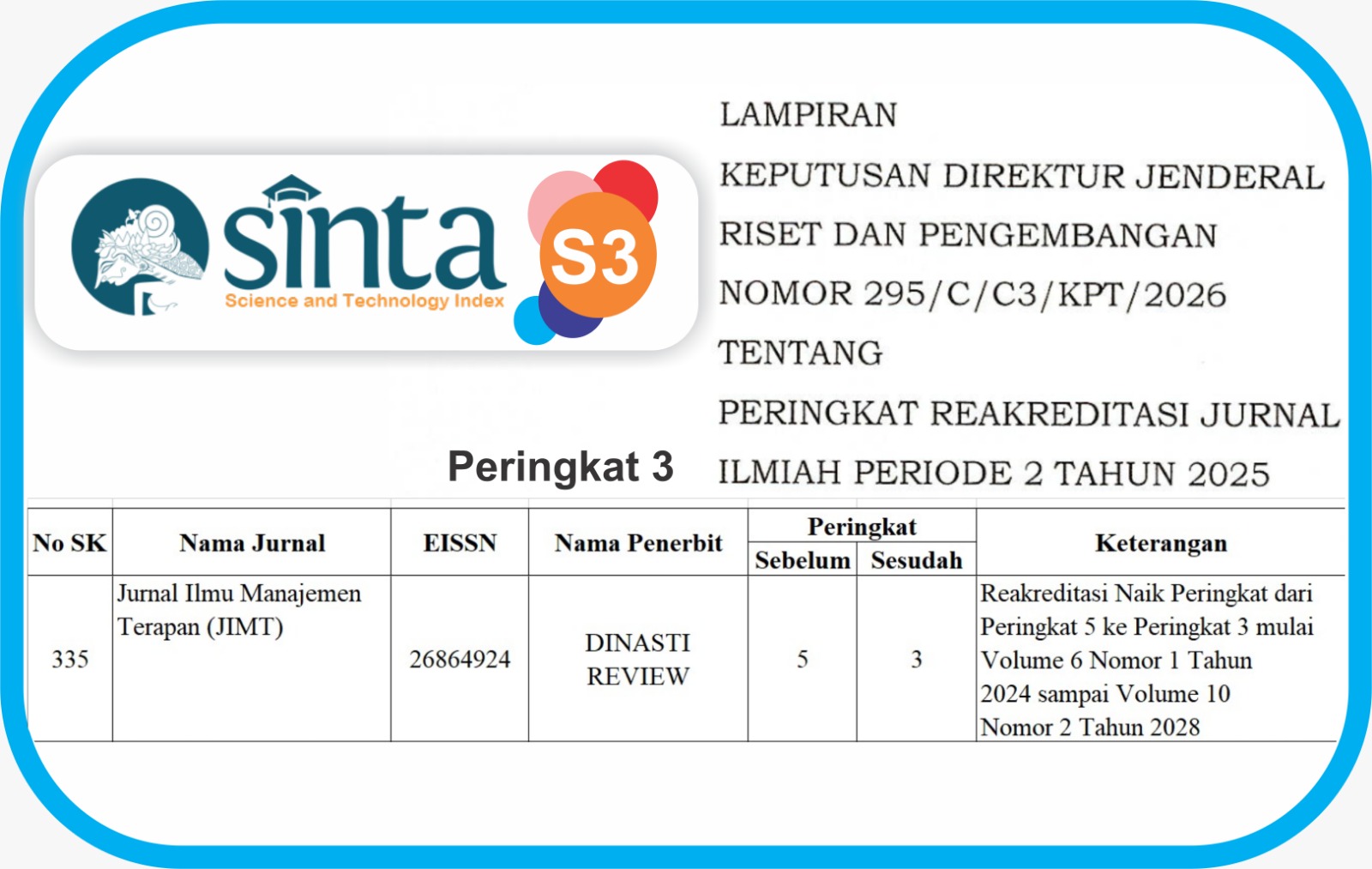Peran Digital Leadership dalam Mengembangkan Strategi Bisnis yang Sesuai Dengan Transformasi Digital
DOI:
https://doi.org/10.38035/jimt.v6i5.5686Keywords:
Digital Leadership, Transformasi DigitalAbstract
Pemimpin digital diduga memainkan peran penting dalam menyelaraskan teknologi dengan tujuan bisnis, mendorong inovasi, dan beradaptasi dengan lanskap digital yang terus berubah. Penelitian ini berupaya mengelaborasi lebih lanjut sejauh mana peran kepemimpinan digital dalam mengembangkan strategi bisnis yang sesuai dengan transformasi digital. Peneklitian ini menggunakan literature review dari penelitian sebelumnya dan sejumlah buku yang relevan. Hasil analisis menunjukkan bahwa pemimpin digital akan membantu organisasi mengidentifikasi peluang, mengelola perubahan, dan membangun budaya yang mendukung transformasi digital. Perubahan organisasi biasanya diprakarsai oleh pemimpin dan manajemen puncak. Oleh karena itu, pemimpin dan manajemen perusahaan harus terlebih dahulu menerima perlunya perubahan bagi diri mereka sendiri dan kemudian bagi seluruh organisasi serta meyakinkan organisasi untuk berubah. Oleh karena itu, keberhasilan transformasi digital juga tergantung pada seberapa besar peran kepemimpinan digital dalam mengarahkannya
References
Avolio, B. J., Kahai, S., & Dodge, G. E. (2000). E-leadership. The Leadership Quarterly, 11(4), 615–668. https://doi.org/10.1016/S1048-9843(00)00062-X
Bonvillian, W. B. (2017). Advanced Manufacturing: A New Policy Challenge. Annals of Science and Technology Policy, 1(1), 1–131. https://doi.org/10.1561/110.00000001
Bughin, J., Manyika, J., & Ve Catlin, T. (2020). Twenty-five Years of Digitalization: Ten Insights on How to Play It. McKinsey Global Institute (MGI).
Bukhari, K. (2023). Impact of Technology on Leadership and Governance in Pakistan. International Journal of Leadership and Governance, 3(1), 36–47. https://doi.org/10.47604/ijlg.1927
Bukht, R., & Heeks, R. (2018). Defining, Conceptualising and Measuring the Digital Economy. International Organisations Research Journal, 13(2), 143–172. https://doi.org/10.17323/1996-7845-2018-02-07
Corey, K. E., Wilson, M. I., & Fan, P. (2014). Cities, Technology, and Economic Change. In R. Paddison & T. Hutton (Eds.), Cities and Economic Change. Sage Publications Ltd. .
Cortellazzo, L., Bruni, E., & Zampieri, R. (2019). The Role of Leadership in a Digitalized World: A Review. Frontiers in Psychology, 10. https://doi.org/10.3389/fpsyg.2019.01938
Durmaz, O., Hawrami, S. S., & Hamasaeed, A. M. (2022). The suitable leadership for industry 4.0. Journal of Global Economics and Business, 3(8), 113–124. https://doi.org/10.31039/jgeb.v3i8.43
Fisk, P. (2002). The Making of a Digital Leader. Business Strategy Review, 13(1), 43–50. https://doi.org/10.1111/1467-8616.00201
Gillani, F., Chatha, K. A., Sadiq Jajja, M. S., & Farooq, S. (2020). Implementation of digital manufacturing technologies: Antecedents and consequences. International Journal of Production Economics, 229, 107748. https://doi.org/10.1016/j.ijpe.2020.107748
Guinan, P. J., Parise, S., & Langowitz, N. (2019). Creating an innovative digital project team: Levers to enable digital transformation. Business Horizons, 62(6), 717–727. https://doi.org/10.1016/j.bushor.2019.07.005
Jain, P. , & Mnjama, N. (2016). Managing Knowledge Resources and Records in Modern Organisations. IGI Global.
Janicki, T., & Go?dziewska-Nowicka, A. (2018). Digital economy as a strategy of economic development in the 21st century. Torun Business Review, 17(1), 1–6.
Kamal, A. (2022). Strategic Decision Making. In Research Anthology on Business Continuity and Navigating Times of Crisis (pp. 554–574). IGI Global. https://doi.org/10.4018/978-1-6684-4503-7.ch027
Kane, G., Palmer, D., Phillips, A., Kiron, D., & Buckley, N. (2017). Achieving Digital Maturity. MIT Sloan Management Review and Deloitte University Press.
Khatri, P., & Dutta, S. (2023). Next generation leadership skill set for Industry 4.0. International Journal of Public Sector Performance Management, 11(2), 191. https://doi.org/10.1504/IJPSPM.2023.129692
Khaw, T. Y., Teoh, A. P., Abdul Khalid, S. N., & Letchmunan, S. (2022). The impact of digital leadership on sustainable performance: a systematic literature review. Journal of Management Development, 41(9/10), 514–534. https://doi.org/10.1108/JMD-03-2022-0070
Klein, M. (2020). Leadership Characteristics In The Era Of Digital Transformation. Business & Management Studies: An International Journal, 8(1), 883–902. https://doi.org/10.15295/bmij.v8i1.1441
Koch, T., & Windsperger, J. (2017). Seeing through the network: Competitive advantage in the digital economy. Journal of Organization Design, 6(1), 6. https://doi.org/10.1186/s41469-017-0016-z
Kokot, K., ?un?ek Kokotec, I., & Kla?mer ?alopa, M. (2023). Digital Leadership and Maturity as a Key to Successful Digital Transformation: Country Case Study of Croatia. TEM Journal, 192–199. https://doi.org/10.18421/TEM121-25
Kokot, K., Kokotec, I. D., & Calopa, M. K. (2021). Impact of Leadership on Digital Transformation. 2021 IEEE Technology & Engineering Management Conference - Europe (TEMSCON-EUR), 1–6. https://doi.org/10.1109/TEMSCON-EUR52034.2021.9488620
Larjovuori, R. L., Bordi, L., Mäkiniemi, J. P., & Heikkilä-Tammi, K. (2016). The Role of Leadership and Employee Well-Being in Organisational Digitalisation. In T. Russo- Spena & C. Mele (Eds.), 26th Annual RESER Conference (pp. 1159–1172).
Ly, B. (2024). The Interplay of Digital Transformational Leadership, Organizational Agility, and Digital Transformation. Journal of the Knowledge Economy, 15(1), 4408–4427. https://doi.org/10.1007/s13132-023-01377-8
Makedon, V., Krasnikova, N., Krupskyi, O., & Stasiuk, Y. (2022). Arrangement of Digital Leadership Strategy by Corporate Structures: A Review. Ikonomicheski Izsledvania, 31(8), 19–40.
Matt, C., Hess, T., & Benlian, A. (2015). Digital Transformation Strategies. Business & Information Systems Engineering, 57(5), 339–343. https://doi.org/10.1007/s12599-015-0401-5
Munoz, J. M. (2025). Introduction: digital leadership and a new paradigm. In Digital Leadership (pp. 1–7). Edward Elgar Publishing. https://doi.org/10.4337/9781035321247.00005
Oberer, B., & Erkollar, A. (2018). Leadership 4.0: Digital Leaders in the Age of Industry 4.0. International Journal of Organizational Leadership, 7(4), 404–412. https://doi.org/10.33844/ijol.2018.60332
Pedersen, L. H. (2018). Sharpening the Arithmetic of Active Management. Financial Analysts Journal, 74(1), 21–36. https://doi.org/10.2469/faj.v74.n1.4
Petry, T. (2018). Digital Leadership (pp. 209–218). https://doi.org/10.1007/978-3-319-73546-7_12
Qiao, G., Li, Y., & Hong, A. (2024). The Strategic Role of Digital Transformation: Leveraging Digital Leadership to Enhance Employee Performance and Organizational Commitment in the Digital Era. Systems, 12(11), 457. https://doi.org/10.3390/systems12110457
Qureshi, S. (2019). Perspectives on development: why does studying information and communication technology for development (ICT4D) matter? Information Technology for Development, 25(3), 381–389. https://doi.org/10.1080/02681102.2019.1658478
Ready, D., Cohen, C., Kiron, D., & Pring, B. (2020). The New Leadership Playbook for the Digital Age. MIT Sloan Management Review research.
Sa?ba?, M., & Erdo?an, F. A. (2022). Digital Leadership: A Systematic Conceptual Literature Review. ?stanbul Kent Üniversitesi ?nsan ve Toplum Bilimleri Dergisi, 3(1), 17–36.
Tanniru, M., Khuntia, J., & Weiner, J. (2018). Hospital Leadership in Support of Digital Transformation. Pacific Asia Journal of the Association for Information Systems, 1–24. https://doi.org/10.17705/1pais.10301
Taskan, B., Junça-Silva, A., & Caetano, A. (2022). Clarifying the conceptual map of VUCA: a systematic review. International Journal of Organizational Analysis, 30(7), 196–217. https://doi.org/10.1108/IJOA-02-2022-3136
Vial, G. (2019). Understanding digital transformation: A review and a research agenda. The Journal of Strategic Information Systems, 28(2), 118–144. https://doi.org/10.1016/j.jsis.2019.01.003
Westerman, G., Bonnet, D., & Ve Mcafee, A. (2014). The nine elements of digital transformation. MIT Sloan Manag. Rev, 55, 1–6.
Willcocks, L. P. (2024). Automation, digitalization and the future of work: A critical review. Journal of Electronic Business & Digital Economics, 3(2), 184–199. https://doi.org/10.1108/JEBDE-09-2023-0018
Yao, Q., Tang, H., Boadu, F., & Xie, Y. (2023). Digital Transformation and Firm Sustainable Growth: The Moderating Effects of Cross-border Search Capability and Managerial Digital Concern. Journal of the Knowledge Economy, 14(4), 4929–4953. https://doi.org/10.1007/s13132-022-01083-x
Yao, Q., Tang, H., Liu, Y., & Boadu, F. (2024). The penetration effect of digital leadership on digital transformation: the role of digital strategy consensus and diversity types. Journal of Enterprise Information Management, 37(3), 903–927. https://doi.org/10.1108/JEIM-09-2022-0350
Yaroslavovych, M. N., & Nataliya, C. (2023, April). The influence of modern technologies on the effectiveness of management and decision-making in organizations. Proceedings of the Theoretical and Practical Aspects of Modern Scientific Research Conference.
Downloads
Published
How to Cite
Issue
Section
License
Copyright (c) 2025 Heru Nugroho, Selamet Riyadi, Heni Iswati, Panca Maulana, Ravindra Safitra

This work is licensed under a Creative Commons Attribution 4.0 International License.
Penulis yang mempublikasikan manuskripnya di jurnal ini menyetujui ketentuan berikut:
- Hak cipta pada setiap artikel adalah milik penulis.
- Penulis mengakui bahwaJurnal Ilmu Manajemen Terapan (JIMT) berhak menjadi yang pertama menerbitkan dengan lisensi Creative Commons Attribution 4.0 International (Attribution 4.0 International CC BY 4.0) .
- Penulis dapat mengirimkan artikel secara terpisah, mengatur distribusi non-eksklusif manuskrip yang telah diterbitkan dalam jurnal ini ke versi lain (misalnya, dikirim ke repositori institusi penulis, publikasi ke dalam buku, dll.), dengan mengakui bahwa manuskrip telah diterbitkan pertama kali di Jurnal Ilmu Manajemen Terapan (JIMT).














































